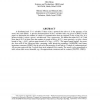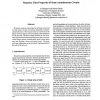75 search results - page 8 / 15 » Lower Bounds for Asynchronous Consensus |
WDAG
1990
Springer
14 years 4 days ago
1990
Springer
A distributed task T is 1-solvable if there exists a protocol that solves it in the presence of (at most) one crash failure. A precise characterization of the 1-solvable tasks was...
ASYNC
1997
IEEE
13 years 11 months ago
1997
IEEE
Wediscuss response timeproperties of linear arrays and tree-like arrays of cells with various handshake communication behaviours. The response times of a networkare the delays bet...
PODC
2003
ACM
14 years 1 months ago
2003
ACM
Consider a dynamic, large-scale communication infrastructure (e.g., the Internet) where nodes (e.g., in a peer to peer system) can communicate only with nodes whose id (e.g., IP a...
PODC
2010
ACM
13 years 12 months ago
2010
ACM
: The Borowsky-Gafni (BG) simulation algorithm is a powerful reduction algorithm that shows that t-resilience of decision tasks can be fully characterized in terms of wait-freedom....
ISAAC
2009
Springer
14 years 2 months ago
2009
Springer
Abstract. Set agreement is a fundamental problem in distributed computing in which processes collectively choose a small subset of values from a larger set of proposals. The imposs...


